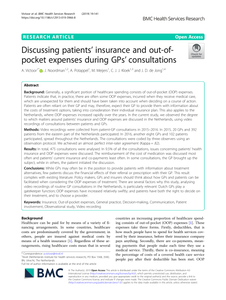Abstract Background: Many countries in Europe have implemented managed competition and patient choice during the last decade. With the introduction of managed competition, health insurers also became an important stakeholder. They purchase services on behalf of their customers and are allowed to contract healthcare providers selectively. It has, therefore, become increasingly important to take one's insurance into account when choosing a provider. There is little evidence that patients make active choices in the way that policymakers assume they do. This research aims to investigate, firstly, the role of patients in choosing a healthcare provider at the point of referral, then the role of the GP and, finally, the influence of the health insurer/insurance policies within this process. Methods: We videotaped a series of everyday consultations between Dutch GPs and their patients during 2015 and 2016. In 117 of these consultations, with 28 GPs, the patient was referred to another healthcare provider. These consultations were coded by three observers using an observation protocol which assessed the role of the patient, GP, and the influence of the health insurer during the referral. Results: Patients were divided into three groups: patients with little or no input, patients with some input, and those with a lot of input. Just over half of the patients (56%) seemed to have some, or a lot of, input into the choice of a healthcare provider at the point of referral by their GP. In addition, in almost half of the consultations (47%), GPs inquired about their patients' preferences regarding a healthcare provider. Topics regarding the health insurance or insurance policy of a patient were rarely (14%) discussed at the point of referral. Conclusions: Just over half of the patients appear to have some, or a lot of, input into their choice of a healthcare provider at the point of referral by their GP. However, the remainder of the patients had little or no input. If more patient choice continues to be an important aim for policy makers, patients should be encouraged to actively choose the healthcare provider who best fits their needs and preferences.
DOCUMENT

Background: Generally, a significant portion of healthcare spending consists of out-of-pocket (OOP) expenses. Patients indicate that, in practice, there are often some OOP expenses, incurred when they receive medical care, which are unexpected for them and should have been taken into account when deciding on a course of action. Patients are often reliant on their GP and may, therefore, expect their GP to provide them with information about the costs of treatment options, taking into consideration their individual insurance plan. This also applies to the Netherlands, where OOP expenses increased rapidly over the years. In the current study, we observed the degree to which matters around patients' insurance and OOP expenses are discussed in the Netherlands, using video recordings of consultations between patients and GPs. Methods: Video recordings were collected from patient-GP consultations in 2015-2016. In 2015, 20 GPs and 392 patients from the eastern part of the Netherlands participated. In 2016, another eight GPs and 102 patients participated, spread throughout the Netherlands. The consultations were coded by three observers using an observation protocol. We achieved an almost perfect inter-rater agreement (Kappa = .82). Results: In total, 475 consultations were analysed. In 9.5% of all the consultations, issues concerning patients' health insurance and OOP expenses were discussed. The reimbursement of the cost of medication was discussed most often and patients' current insurance and co-payments least often. In some consultations, the GP brought up the subject, while in others, the patient initiated the discussion. Conclusions: While GPs may often be in the position to provide patients with information about treatment alternatives, few patients discuss the financial effects of their referral or prescription with their GP. This result complies with existing literature. Policy makers, GPs and insurers should think about how GPs and patients can be facilitated when considering the OOP expenses of treatment. There are several factors why this study, analysing video recordings of routine GP consultations in the Netherlands, is particularly relevant: Dutch GPs play a gatekeeper function; OOP expenses have increased relatively swiftly; and patients have both the right to decide on their treatment, and to choose a provider.
DOCUMENT

The main objective of this report is to analyse and inform about international labour mobility, particularly within Europe, from the perspective of the Dutch Health and Social Care Sector. The report starts by describing the introduction of a new care system in The Netherlands. The government does not participate directly in the actual provision of care. This is a task principally for private care suppliers. Furthermore, the legal position of the Health and Social Care professions, regulated through the Individual Health Care Professions Act, and questions like the international recognition of degrees and the evaluation of foreign diplomas are discussed. This is followed by a clarification of the Dutch education system, particularly, relating to the study of medicine, nursing education and social work education. Subsequently, some core data on the ageing Dutch population are presented. The grey pressure increases and this will have an impact on health spending, health support and the future labour market. Then what follows is a description of the development of employment in the Dutch Health and Social Care Sector, per branch as well as the professions that are engaged in it. The general picture, at this moment, is that the Health and Social Care labour market is reasonably in balance. This trend will continue in the near future; shortages are expected only in the long term. All research done on the subject indicates that international mobility of medical and social professionals is still low in the Netherlands. The question remains whether a more active recruitment policy would be a solution for the expected long term shortages. The report concludes with a look at recruitment policy and some of its developments at the global, national and local level.
DOCUMENT
